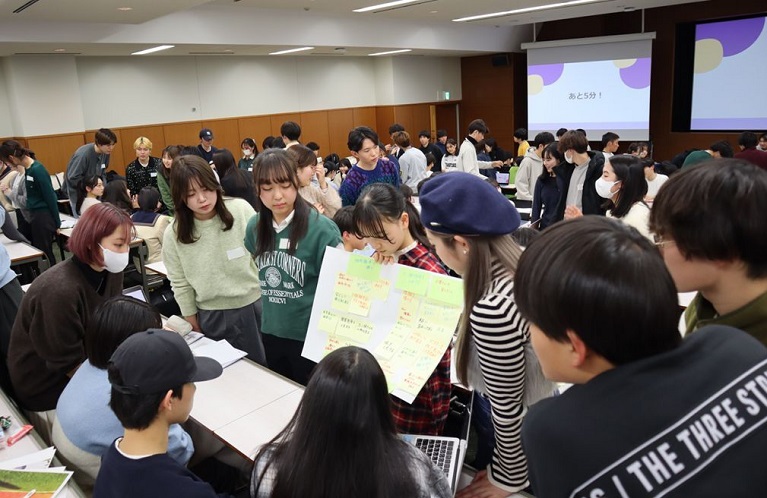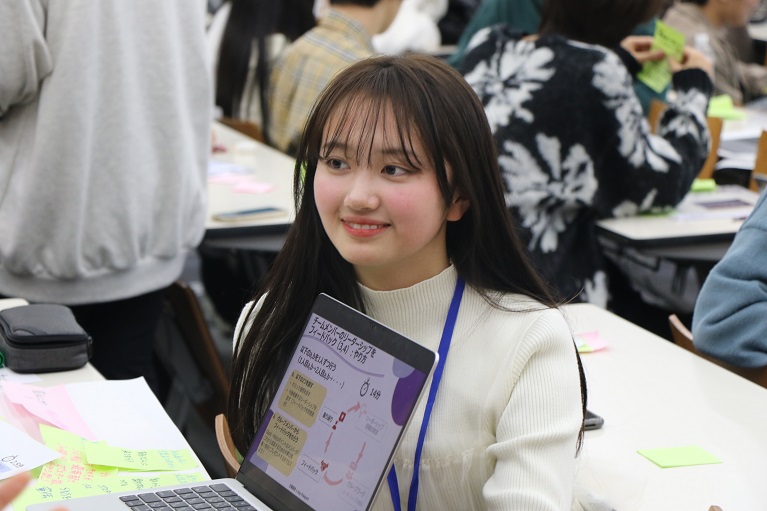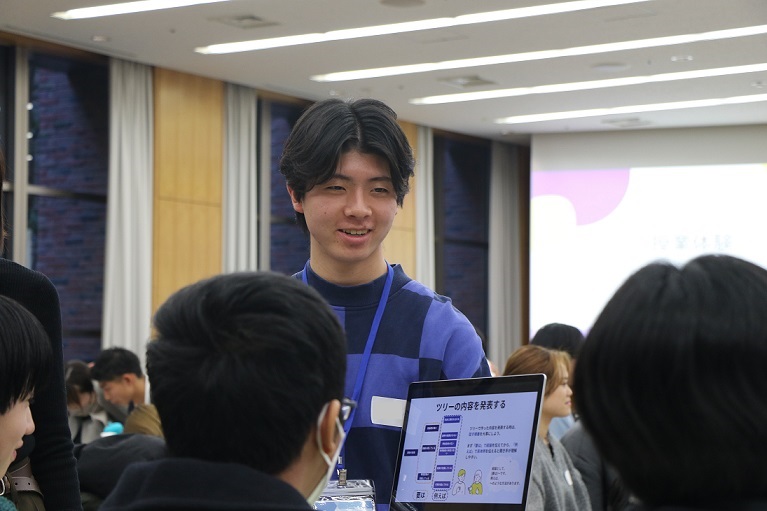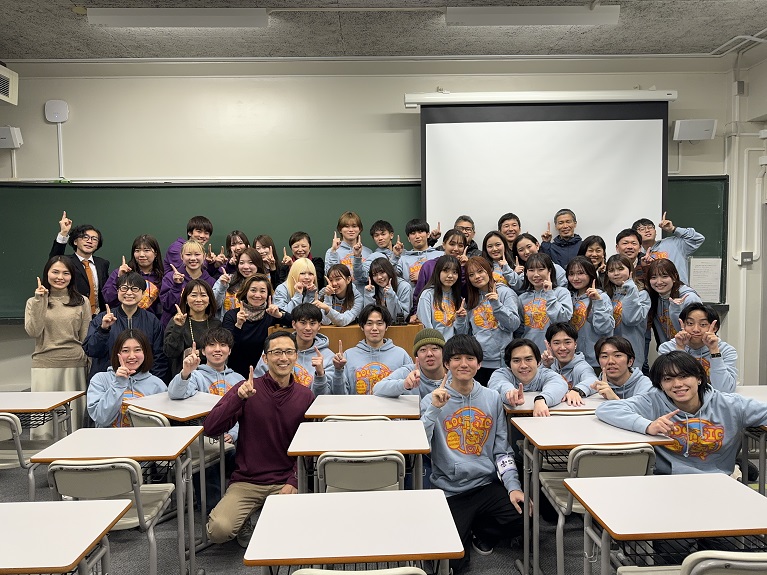Jan 06, 2024
Rikkyo COB 1-Day Passport 2024
OBJECTIVE.
“The Rikkyo College of Business (COB) 1-Day Passport 2024” was held on January 6, 2024, at the Rikkyo University Ikebukuro campus. The event introduced two concepts: “Class experience at COB” and “Learning Leadership and Logical Thinking Through Group Work”. First-year students conducted a trial class program for high school students and recent graduates. A total of 382 attendees from 28 prefectures across Japan participated, experiencing COB classes and the campus life atmosphere at Rikkyo University.
What is a 1-Day Passport?
The 1-Day Passport is an event organized by COB first-year students to provide a trial class experience for high school students and graduates. This program is part of a compulsory subject for most COB first-year students, “Logical Thinking and Leadership 1 (Business Leadership 1)”. On the event day, university and high school students work in teams of 4-5 members each. Throughout 14 classes in the BL1 course, university students learn logical thinking in the first half and then prepare original lesson materials for the 1-day event in the second half. During the event, university students act as instructors for high school students, even though they are usually the ones receiving classes. This experience allows them to deepen their understanding of logical thinking by teaching their learning to others.
Features of the 1 Day-Passport
1. Event Operation by Student Staff
The BL1 employs a "Student Staff system," where second-year students serve as Student Assistants (SAs) and Course Assistants (CAs). These Student Staff usually facilitate classes. Since the 1-day event is also part of their course, the Student Staff not only facilitate and assist attendees during the event but also handle most tasks, including behind-the-scenes activities such as staffing and advertising for participation.
2. COB First-Year Students as Instructors
COB first-year students act as instructors, conducting classes for high school students and graduates. They prepare engaging lesson materials for the event, receiving feedback from faculty, Student Staff, and senior students. This teaching experience, different from receiving classes, provides an excellent opportunity for them to develop leadership skills and grow.
The BL1 employs a "Student Staff system," where second-year students serve as Student Assistants (SAs) and Course Assistants (CAs). These Student Staff usually facilitate classes. Since the 1-day event is also part of their course, the Student Staff not only facilitate and assist attendees during the event but also handle most tasks, including behind-the-scenes activities such as staffing and advertising for participation.
2. COB First-Year Students as Instructors
COB first-year students act as instructors, conducting classes for high school students and graduates. They prepare engaging lesson materials for the event, receiving feedback from faculty, Student Staff, and senior students. This teaching experience, different from receiving classes, provides an excellent opportunity for them to develop leadership skills and grow.
Schedule for the 1-Day Passport
The program consists of three sections: Introduction, Class Experience, and Group Review.
1. Introduction: Overview of Rikkyo COB and Leadership
This year, the program introduced a new initiative. Before the opening session, university students answered questions collected from high school students on social media. The event began with an opening video created by Student Staff. During the icebreaker, all participants danced together, enjoying a routine prepared by the Student Staff to help high school students relax. Initially, the high school students appeared nervous but soon started to enjoy the activity, becoming lively and engaged.
Next, the Student Staff explained "Rikkyo COB" and "Leadership". The Rikkyo COB defines leadership as "the influence of affecting other team members to achieve team goals". This concept is learned not only in the BL1 course but also throughout the BLP programs.
At the end of this session, everyone set their leadership goals and then moved on to the next session.
Next, the Student Staff explained "Rikkyo COB" and "Leadership". The Rikkyo COB defines leadership as "the influence of affecting other team members to achieve team goals". This concept is learned not only in the BL1 course but also throughout the BLP programs.
At the end of this session, everyone set their leadership goals and then moved on to the next session.
2. Class Experience

The Class Experience is a key part of the event where high school students and graduates gain first-hand insight into the COB. First-year university students deliver lectures using meticulously prepared lesson materials, receiving advice from faculty and senior students. The high school students tackled various tasks such as, “What is a solution to increase sales of your shop at school festivals?”, “How do you keep your room clean?”, and “How do you avoid failing at online shopping?”. They brainstormed their solutions on sticky notes and poster papers. The first-year university students put considerable efforts not only to preparing material slides but also to explaining the content effectively and creating an engaging atmosphere. Their impressive efforts in leading the class and taking on individual roles were evident throughout the session.
3.Group Review

The COB also emphasizes the importance of reflection activities. By not only learning logical thinking but also reviewing their leadership behaviors during the class experience, students can deepen their understanding of both concepts. Interactive feedback among team members, discussing how and when their leadership behaviors influenced others, helps them assess whether they achieved the goals set at the beginning. Moreover, this process allows them to recognize previously unnoticed strengths, contributing to further personal growth. After completing the program, high school participants commented, "I could experience a real university class," and "I enjoyed exploring leadership and logical thinking."
Comment Excerpts from First-Year Students

・I'm happy I had the opportunity to experience teaching, as I am usually a receiver of classes. I found fulfillment in organizing the class flexibly, even when time was running short. Although I haven't been good at speaking in public, I unexpectedly discovered that I could speak well and enjoyed speaking with confidence through various challenging tasks.
・I found high school students absorbed a lot from our prepared class. This realization enabled me to revisit my initial objective. Through teaching experience, I learned an instructor’s enthusiasm is essential for delivering effective classes, such as feeling “I like this field” and “I am eager to convey this content”.
・I found high school students absorbed a lot from our prepared class. This realization enabled me to revisit my initial objective. Through teaching experience, I learned an instructor’s enthusiasm is essential for delivering effective classes, such as feeling “I like this field” and “I am eager to convey this content”.
Comment from BL1 Course Leader, Visiting Associate Professor Uda

Every year, during the 1-Day Passport event, high school students work in groups with fellow students they meet for the first time, regardless of their grades. A total of 382 attendees from 28 prefectures across Japan participated this year, experiencing a class where 4-5 university students lectured on logical thinking to 4-5 high school students in one group.
This activity is high-level and challenging, as university students need to effectively convey the concept of logical thinking while fostering relationships between university and high school students, as well as among high school students, all within a 55-minute class. Despite the challenging content, high school students enjoyed learning, and this event also provided an excellent opportunity for university students to recognize their learning achievements.
Learning logical thinking for a four-month class and then teaching it to high school students in an enjoyable way may seem impossible at first. However, I believe the experience you created with outstanding achievements through effortless work led to your confidence. I hope you will continue to gain excellent experiences through various future challenges.
This activity is high-level and challenging, as university students need to effectively convey the concept of logical thinking while fostering relationships between university and high school students, as well as among high school students, all within a 55-minute class. Despite the challenging content, high school students enjoyed learning, and this event also provided an excellent opportunity for university students to recognize their learning achievements.
Learning logical thinking for a four-month class and then teaching it to high school students in an enjoyable way may seem impossible at first. However, I believe the experience you created with outstanding achievements through effortless work led to your confidence. I hope you will continue to gain excellent experiences through various future challenges.
